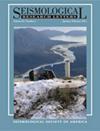深度学习与浅层学习:基于深度学习的深度相位提取与地震深度估计
IF 3.2
3区 地球科学
Q2 GEOCHEMISTRY & GEOPHYSICS
引用次数: 1
摘要
远震自动监测是全球地震活动性分析的重要组成部分。尽管以自动化的方式约束震中是一种成熟的技术,但约束事件深度实际上更加困难。解决这一挑战的一种方法是远震深度相位,但目前还不能通过自动检测方法精确识别。在这里,我们提出了两个深度学习模型,DepthPhaseTEAM和DepthPhaseNet,来检测和选择深度阶段。为了训练模型,我们基于ISC-EHB公告创建了一个数据集——一个带有详细阶段注释的高质量目录。我们展示了如何将预测的相位到达概率曲线反向投影到深度轴上,从而得到地震深度的准确估计。此外,我们展示了多站模型DepthPhaseTEAM如何比单站模型DepthPhaseNet产生更好和更一致的预测。为了允许直接应用我们的模型,我们将它们集成到SeisBench库中。本文章由计算机程序翻译,如有差异,请以英文原文为准。
Learning the Deep and the Shallow: Deep-Learning-Based Depth Phase Picking and Earthquake Depth Estimation
Abstract Automated teleseismic earthquake monitoring is an essential part of global seismicity analysis. Although constraining epicenters in an automated fashion is an established technique, constraining event depths is substantially more difficult. One solution to this challenge is teleseismic depth phases, but these can currently not be identified precisely by automatic detection methods. Here, we propose two deep-learning models, DepthPhaseTEAM and DepthPhaseNet, to detect and pick depth phases. For training the models, we create a dataset based on the ISC-EHB bulletin—a high-quality catalog with detailed phase annotations. We show how backprojecting the predicted phase arrival probability curves onto the depth axis yields accurate estimates of earthquake depth. Furthermore, we show how a multistation model, DepthPhaseTEAM, leads to better and more consistent predictions than the single-station model, DepthPhaseNet. To allow direct application of our models, we integrate them within the SeisBench library.
求助全文
通过发布文献求助,成功后即可免费获取论文全文。
去求助
来源期刊

Seismological Research Letters
地学-地球化学与地球物理
CiteScore
6.60
自引率
12.10%
发文量
239
审稿时长
3 months
期刊介绍:
Information not localized
 求助内容:
求助内容: 应助结果提醒方式:
应助结果提醒方式:


